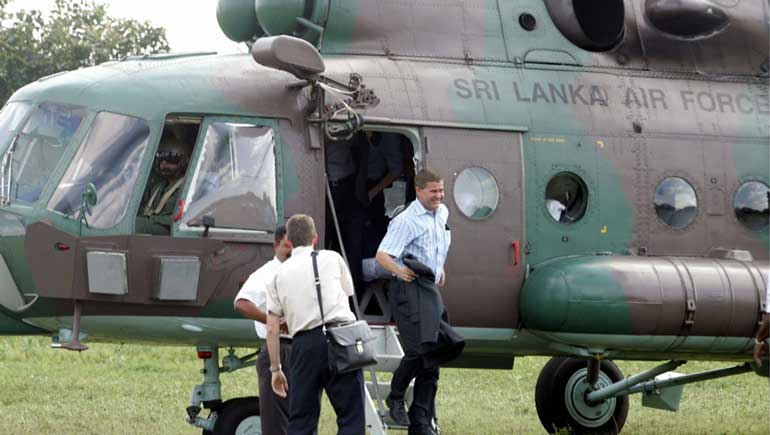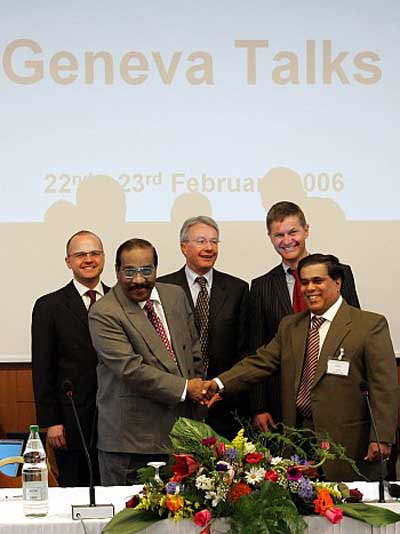Saturday Feb 14, 2026
Saturday Feb 14, 2026
Monday, 14 September 2015 00:00 - - {{hitsCtrl.values.hits}}


 Q: In an interview with the Norwegian Public Service Radio and Television Broadcaster, NRK, you said that the “New Sri Lanka” needs political support, assistance, tourists and investment to succeed. This came to light subsequent to the Presidential Election held in January. Can you clarify your new involvement with the Government led by President Maithripala Sirisena and Prime Minister Ranil Wickremesinghe?
Q: In an interview with the Norwegian Public Service Radio and Television Broadcaster, NRK, you said that the “New Sri Lanka” needs political support, assistance, tourists and investment to succeed. This came to light subsequent to the Presidential Election held in January. Can you clarify your new involvement with the Government led by President Maithripala Sirisena and Prime Minister Ranil Wickremesinghe?
A: Sri Lanka is a nation with enormous potential. The inhabitants are hardworking and highly educated. The land is rich and incredibly beautiful. Still Sri Lanka is economically lagging behind most nations in East Asia for instance. If I in any way can be of assistance to unleash the Sri Lankan potential, I will be very happy. I am ready to assist in any way deemed useful by Sri Lankan leaders, promote investment and tourism, provide advocacy with the international community or political advice. After 17 years of involvement with Sri Lanka, I consider myself an all-weather friend of the island.
Q: Prior to this interview, you stated to me that this is truly a very exciting time for Sri Lanka. Would you say that you have more faith and confidence in the new Government in comparison with the Rajapaksa administration in light of the fact that few who criticised your stance are present in the new Government?
A: Yes. I share the view of India, the US, Europe and nearly all foreign observers that the elections in January and August were positive milestones in Sri Lankan history. The people of Sri Lanka went to the polls and decided that the time had come for democracy, putting a stop to human rights abuses and moving toward rapid and inclusive economic growth. I have a lot of faith in the new leaders, nearly all of whom I know well from the past.
Q: Commenting on recent General Elections in your letter to the Hindustan Times, you said: “In many ways the campaign was a referendum on continued Rajapaksa rule. He lost, however, and Sri Lanka can now look to its future rather than its past.” Could you elaborate more on that statement?
A: Nearly all Sinhalese do credit Rajapaksa for bringing the war to an end and restoring peace and normalcy after 2009. However, he wasted the enormous opportunity to reach out to Tamils after the victory and did nothing to resolve their problems, nor did he move Sri Lanka towards ethnic peace and reconciliation. He even cordoned attacks on the vulnerable Muslim community and as a result got hardly a Muslim or Tamil vote. Now the chance has arrived to find a lasting solution to the ethnic conflict and other major issues in the land. It will not be easy, there are many hiccups, but I remain an optimist.
Q: It’s been five years since the war ended, and the country has undergone changes for the better. Peace has been established and many who were displaced by the war have been able to return home. Don’t you think Sri Lanka has proven why it deserves the support of the international community rather than being subjected to judgment?
A: I agree that peace is a major relief for all Sri Lankans. Unfortunately torture and white van disappearances continued even after the war. But indeed, Sri Lanka now has the golden opportunity to resolve its problems through its own hard work. The role of the international community is not to be the Super Judge, but to assist the Government as well as the Tamil National Alliance (TNA) in putting Sri Lanka on a new footing. International political and economic assistance may be helpful, but clearly the lead role will be played by domestic actors. I wish you all luck.

Q: As a person who believes that the war could have been ended through peace talks without military action, you have been frequently subjected to criticism, which in fact was often negative. Reflecting back, is there anything that you would have done differently?
A: I have no complaints with fair criticisms. Certainly a peace facilitator like Norway must accept hard scrutiny. I believe the two main difficulties of the peace process were the LTTE Leader Prabhakaran’s reluctance to embrace federalism when it was on offer and the lack of a bipartisan spirit of the Sri Lanka Freedom Party (SLFP) and the United National Party (UNP).
British Author Mark Salter will soon launch a book called ‘To End a Civil War’. The book will cover all the experiences from the Norwegian peace effort in Sri Lanka. I will welcome debate originating from the book. We should always try to learn from history.